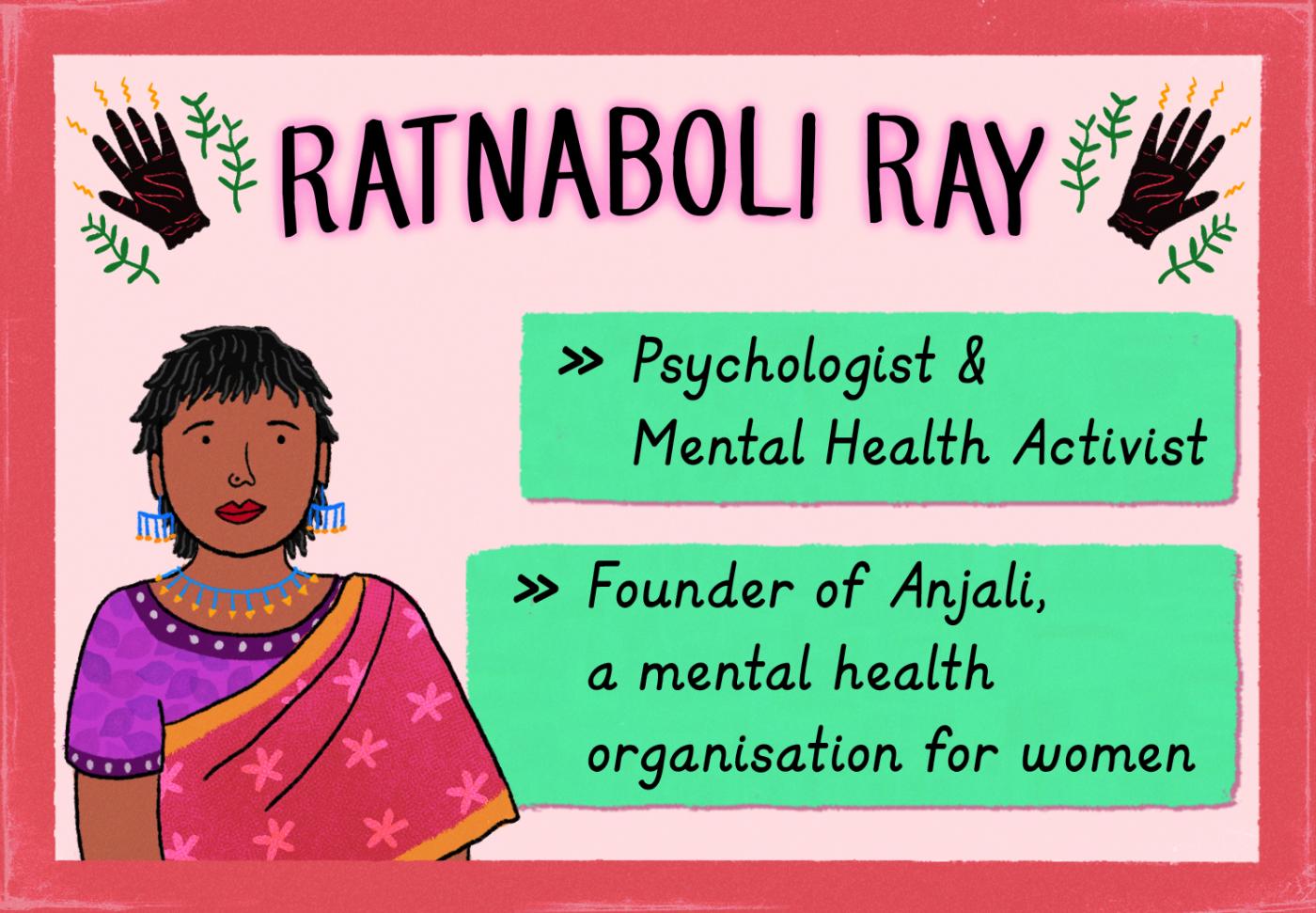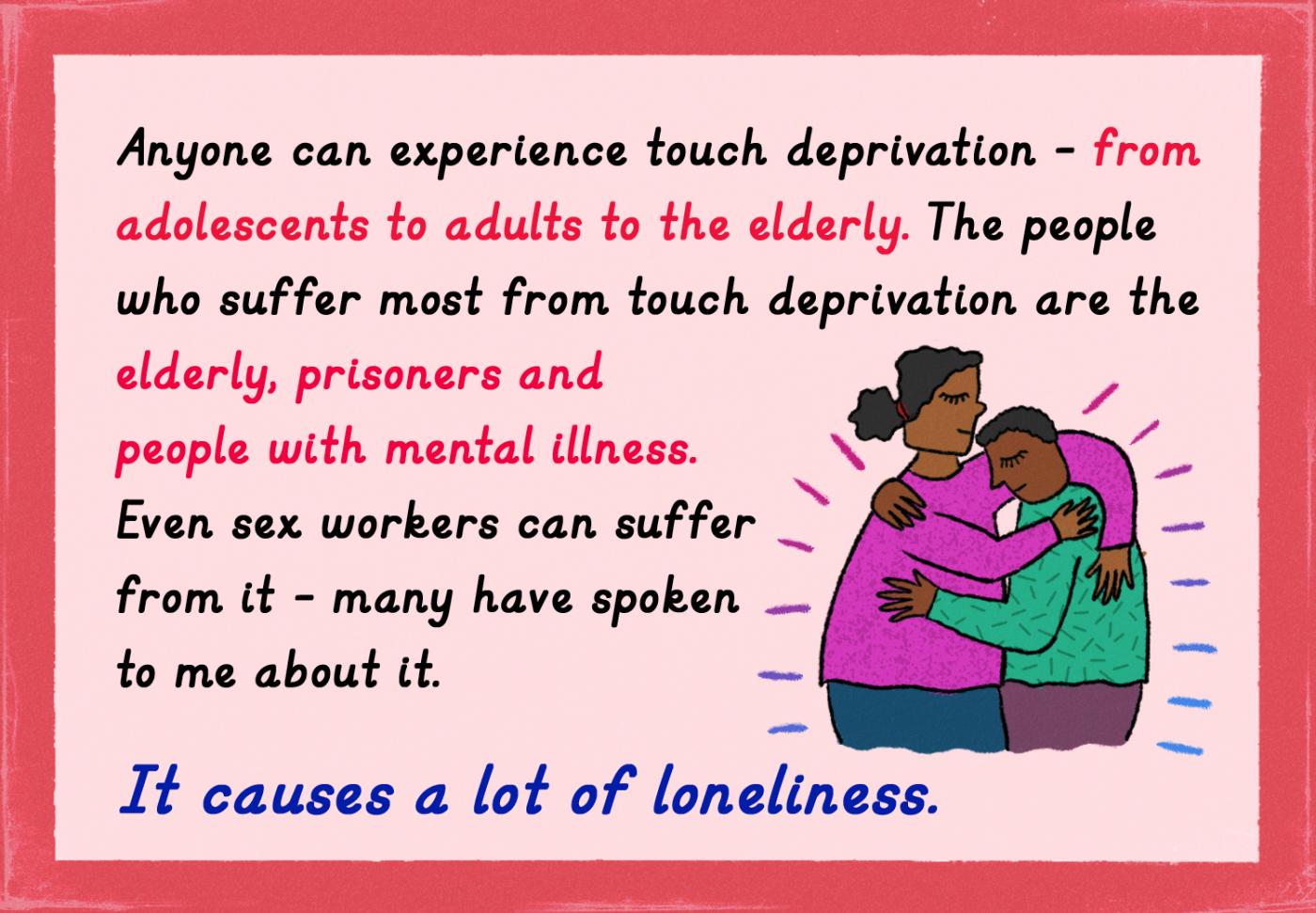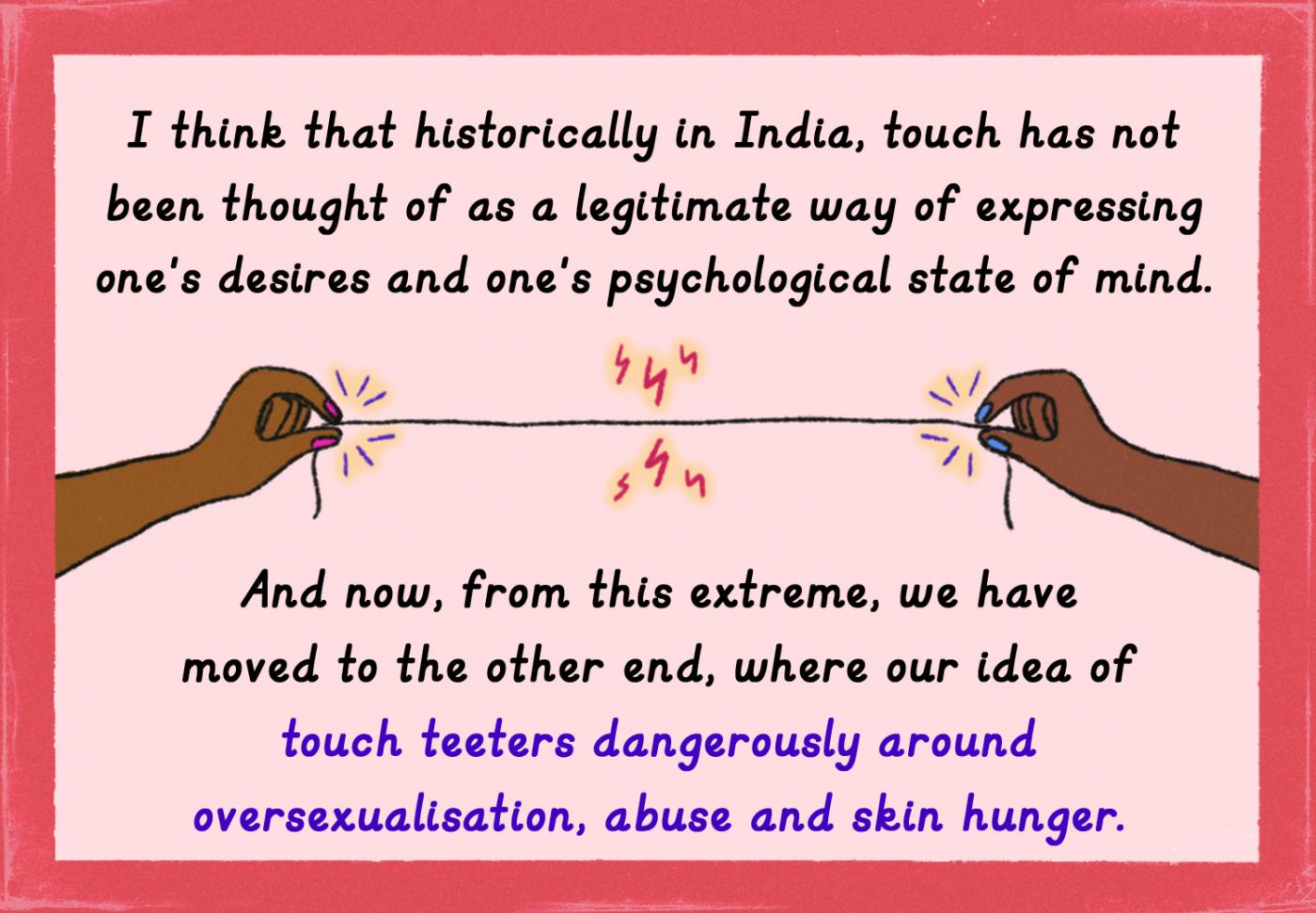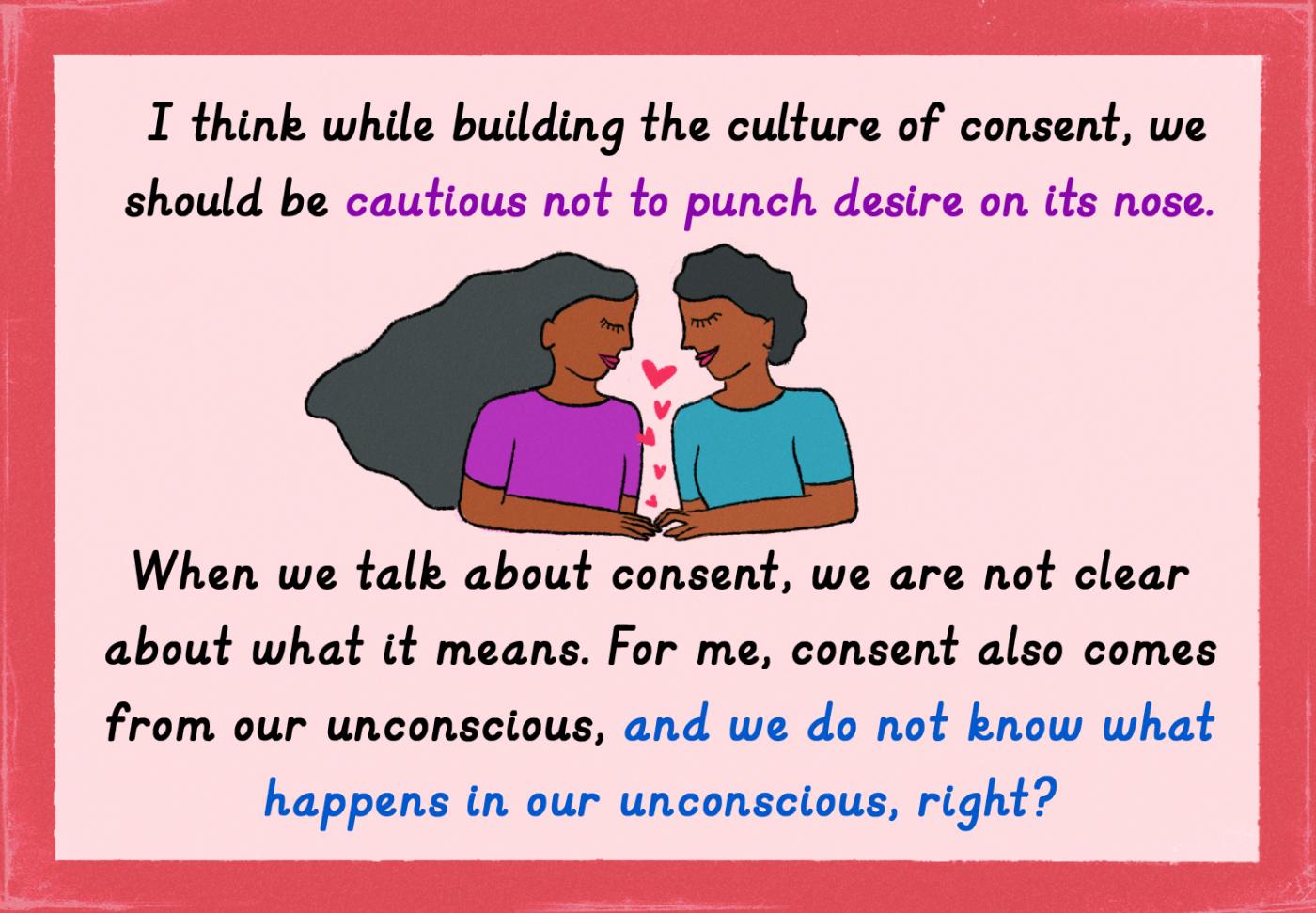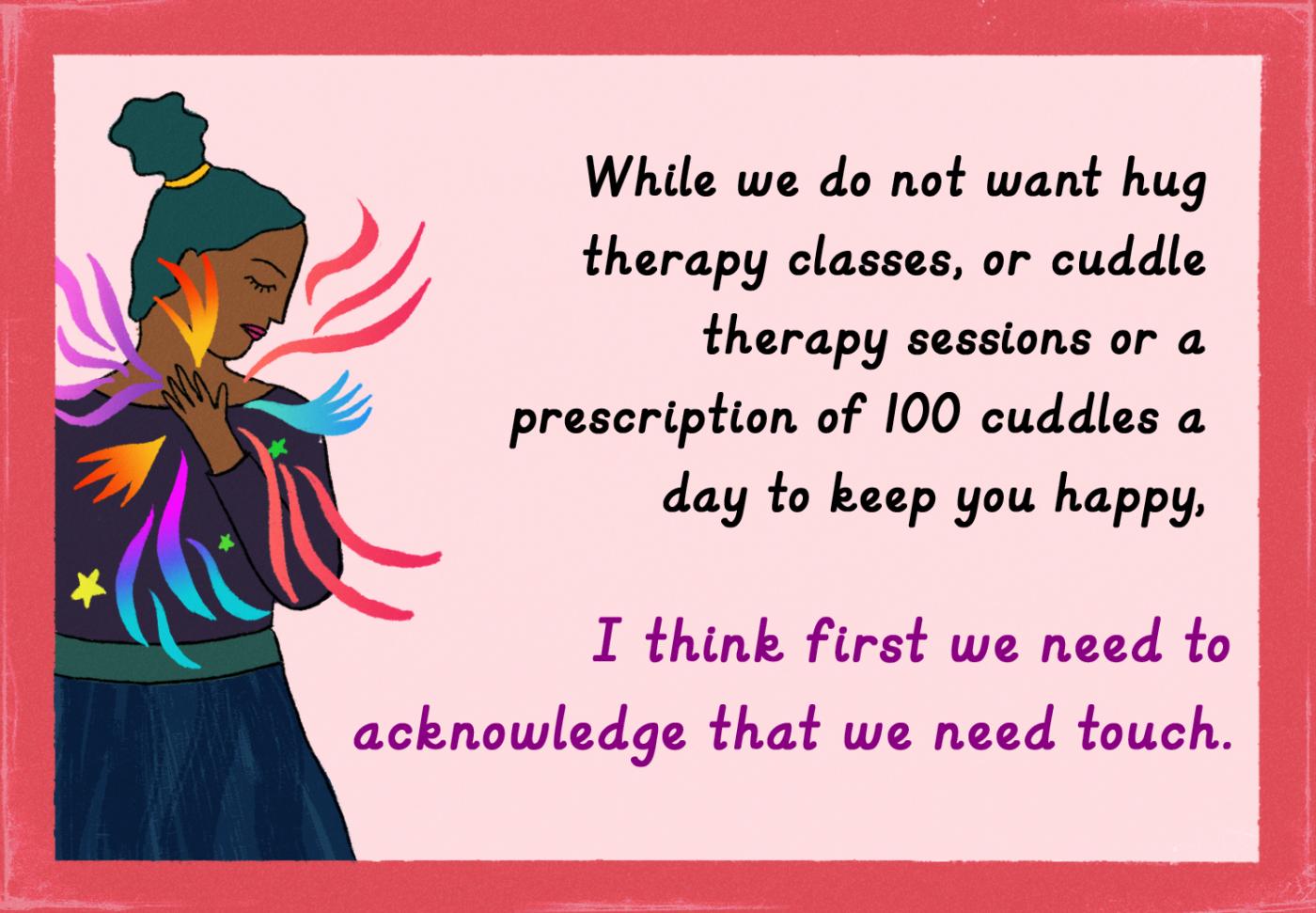How important is touch in our lives? What does it signify to us? How does not being touched affect us?
We spoke to Ratnaboli Ray, a psychologist, mental health activist, and founder of Anjali, a mental health organisation for women, about touch and the many things linked to it that people rarely talk about.
Mental health professionals sometimes use the term ‘skin hunger’ when talking about a lack of touch. What does it really mean?
Often, a lot of people feel upset that they have not been touched. Being touched doesn’t always have to do with sex or sexual pleasure. When people seek touch, what they are often looking for is intimacy, affection, being wanted, being valued. And if you are not touched for a very long time, as I see in my work, it can give rise to a lot of secondary mental health issues like depression.
Sometimes not being touched has to do with one’s appearance and one’s body. The constituency that I work with – and for – are people who are languishing in mental hospitals and because they might have matted hair, skin infections, or yellowed teeth, they are less likely to be touched by others. And doctors don’t need to touch them as a matter of course. If you visit a gastroenterologist, they might have to feel your tummy. If you visit a gynaecologist, they might need to touch you in order to examine you. Psychiatry, unfortunately, is a domain of medicine where a doctor does not need to touch a patient. And therefore, when people are incarcerated or languishing in mental institutions, the whole aspect of touch is completely absent.
People that I’ve worked with have indicated this need for touch in many ways. Many years back when I started working, they all used to sort of fall over me, especially the women. They looked filthy. But the fact that they were not rebuked, not pushed away, was something they appreciated. I remember one girl from Bangladesh saying, “Tumhara dil bahut bada hai.” Much later in another incident when I met some men, I shook hands with them. One of them said, Ratna di, you are the first person who shook hands with me.” So the feeling of being valued, and being respected through touch came across to me very strongly. Now, of course, women are much more open and more tuned in to these things and they do tell us very frankly that they like to be touched. They use a Bengali word, “shurshuri” – the shivery pleasure of being lightly caressed.
It’s not that they called it skin hunger themselves, but they talked about the pleasure of being touched, which I interpret as ‘touch hunger’ or ‘skin hunger’. It is used more formally in mental health discourse, though I do not want to pathologise it.
Anyone can experience touch deprivation – from adolescents to adults to the elderly. The people who suffer most from touch deprivation are the elderly, prisoners and people with mental illness. Even sex workers can suffer from it – many have spoken to me about it. It causes a lot of loneliness. And you’ll see that this deprivation applies to people holed up in custodial places as well as people wandering on the streets. A homeless man or woman, with matted hair and yellow teeth are almost invisible. They take on the dust of the road and their bodies become invisible. When your body is invisible, you become invisible, and then where is the question of being touched, beyond the policeman’s lathi that whacks you on your ass?
In an era of #MeToo, with increasing awareness of sexual assault and child sexual abuse, children are now being taught about ‘good’ and ‘bad’ touch. How do you see these classifications?
As a country, as a culture, touch has only ever been in the privacy of bedrooms or in public when we revere someone, like when we touch an elder’s feet, or when expressing affection towards kids (though the moment you reach adolescence,
touch completely vanishes). Even in my generation, I don’t think people openly hugged each other or held hands with their partners as they walked down streets – I certainly didn’t. I think that historically in India, touch has not been thought of as a legitimate way of expressing one’s desires and one’s psychological state of mind. And now, from this extreme, we have moved to the other end, where our idea of touch teeters dangerously around oversexualisation, abuse and skin hunger.
Through discussion and dialogue, we have to figure out how we can prevent oversexualisation and abuse, but also not deprive ourselves of the touch that we want and crave.
As far as the classification of good touch and bad touch is concerned, I feel it’s wrong because it’s a moral judgement (we risk making all kinds of sexual touch ‘bad’ and shameful), I think we should classify it as ‘safe’ and ‘unsafe’ touch. At the same time, we have got to realise that even if something feels unsafe for a kid, the kid might still feel very stimulated by that touch. So how do we tweak
our conversation to incorporate all of these nuances?
Sometimes touch can be perceived in many ways that may not align with what we are taught to believe. We have not navigated this path very smoothly – we focus on violence, harassment and assault. We also have a large constituency of people whose only experience of touch is via assault. I’m not glorifying assault at all – don’t get me wrong. We’ve had people telling us, yes, they were assaulted, yes, they were raped, but at the time they didn’t recognise it as such.
What are your thoughts on chhed-chhaad (teasing)?
It’s an interesting thing. For some disabled women or women with mental illnesses, it might be the only time they get noticed. And that feeling of “I am being noticed” gives a momentary pleasure. And to be honest, even without mental illness (I don’t know, maybe I will be slammed for saying this), many of us do enjoy teasing sometimes – and not at others. It also signifies attraction and
validates that you are a sexual being.
There has to be a line after which chhed-chhaad is seen as violative and before which it is seen as pleasurable. There can’t be a fixed response to this – that chhed chhad is always bad.
Today, there are efforts towards building a culture of consent. But is there also a growing orthodoxy in how we talk about consent? Are we growing too cautious in our interactions with other people?
Yes, I do think so. I think while building the culture of consent, we should be cautious not to punch desire on its nose.
When we talk about consent, we are not clear about what it means. I don’t agree with the popular video that equates consent with wanting to drink a cup of tea, it’s too simplistic. For me, consent also comes from our unconscious, and we do not know what happens in our unconscious, right? A lot of illegitimate things happen there. In our stated consent we cannot give permission to those ideas.
When we talk about consent, what do we say? No is no, and yes is yes. A thundering no or a thundering yes. On many occasions I have felt that I wanted to say yes but then I decided to say no … it has not been a very clear-cut consent
journey even for myself. And should consent be verbal, or a signal? Is it emotional or rational? When does touch feel safe and when does it feel dangerous? I mean, we haven’t talked much beyond just the ‘yes’, ‘no’ and ‘maybe’ of consent. And also consent in legal terms means something, consent in everyday life means something, consent in sexual transactions means something.
So beyond ‘yes’ ‘no’ and ‘maybe’, what could exist?
I think if we consider consent to be a rainbow, or a spectrum, that would be helpful. Like a yes being a 10% yes – maybe we can approach it like that. We also have to talk a lot about how consent is manifested. We have to understand its interactions with other issues, like power dynamics.
Do we need to incorporate more touch in our everyday lives? And when we do this what do we need to keep in mind?
While we do not want hug therapy classes, or cuddle therapy sessions or a prescription of 100 cuddles a day to keep you happy, I think first we need to acknowledge that we need touch. We need to start thinking about it in an emotional sense. Am I missing touch or not? Only once we acknowledge that we are missing touch can we move forward. Second, we need to start talking about it. The third is to make touch a practice. We often hesitate to touch someone – why this hesitation? Let us not assume that all touch is violative. And it’s important to know our preferences, to be aware when we don’t like it.
Let us not assume that every touch is violative. Even as we talk about safe and unsafe touch, we should acknowledge that touch can also be hugely pleasurable and important in our lives.


